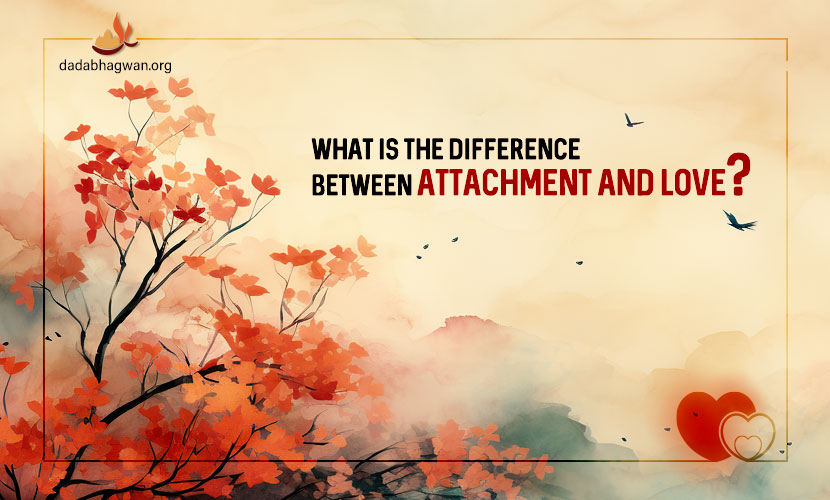What Is the difference between attachment and love?
According to the vision of Param Pujya Dada Bhagwan, attachment and moha are not love. He explains to us the difference between attachment and love through the understanding that is contrary to the worldly belief.

Questioner: What is the difference between love of illusion and real love?
Dadashri: The moth hovers around the flame and sacrifices its life in it. That is called love of illusion, whereas real love will last. There is no illusion in real love. Life of false attachment is useless. It is equivalent to being blind. It is like a blind man who wanders around like the moth and gets consumed in the process. Love, on the other hand, is constant and it gives lifelong happiness. It does not seek instant gratification.
Therefore, all these are false attachments of illusionary love. Everything is an illusion. Love of illusion is simply open strokes of deceit.
All Mistakes are Forgiven in the Devotion of Love!
Where the self-interest is served, there is love; where it is not, there’s hatred—that is not love. There is no desire, moha, attachment or selfishness in true love. For example, if we forget to give a gift to our beloved on their birthday or anniversary, it starts a quarrel, and if we give them their desired gift, love showers! Where there is an expectation of getting something in return, it is not love, it’s trade.
There has to be a limit to the love or affection we have towards the other. We should not expect anything from the other person. For whom we have love and affection, for them expectation is born. Then when that expectation is not fulfilled, it creates agitation and frustration. We suffer. And so, we hurt that person. This is not love; it is moha, which means attachment and the fruit of attachment is quarrel. Where there is attachment, clashes are inevitable. Where there is love, there is no expectation there, no faults of the other person are seen, no hurt is caused. No matter how many insults the other person gives, it does not reduce, and when given praise and respect, it does not increase, that is love.
Where there are similar atoms, there is oneness initially. Since each other’s thoughts match, choices match, one feels love. But after spending some time together, disagreements, pointing out each other’s mistakes, attempts to change or improve each other, arguments, clashes, etc. arise for sure. In love, no matter how many mistakes the other person has, one does not mind.
We shake the thermometer and the mercury drops. By shaking the coin, one can tell from its sound whether the coin is real or counterfeit. Similarly, Param Pujya Dada Bhagwan gives a practical thermometer of testing love.
Questioner: But how can an ordinary individual know the difference between real love and false love? How does the other person know whether one’s love is real or false?
Dadashri: You will find out when you test it. It is best to test it before committing yourself. Just as we tap a rupee coin to test its authenticity, find an excuse to scold the other person and see their reaction. Nowadays selfishness is rampant. People will feign love for selfish motives. You should test it to see whether it is real love or not.
Questioner: Even when you scold…what is that real love like?
Dadashri: The one with such love will remain calm when scolded and take the utmost care not to hurt the offender. In the presence of such love even the wicked person would melt and surrender.
Remembers All Day Long - Such is the Devotion of Love!
This also happens in attachment. So, in this sense, what is difference between attachment and love? Love is such that even if the person is far away and has not met for a very long time, yet s/he only is in one’s consciousness, no one else is in their memory. Whereas in today’s relationships, as soon as one is away a bit, one falls for someone else. How can this be called love? In love, there is surrender. To whom one is devoted, one keeps remembering him/her all day long. The devotion is internal. Even if one’s external beauty is tarnished or decayed, yet love remains the same. The hand that one holds and expresses love, the same hand, when slightly burnt and requires to be bandaged, then leave aside touching, one won’t even see it. Where there is love, there is no hatred, and where there is hatred, there is no love there.
From Attachment, Arises Vengeance: Significant Point for Attachment versus Love!

Where there is excessive attachment, from it, vengeance is bound. In this world, so many such instances take place where a very close person for whom we have love, they only take vengeance. Here, Param Pujya Dada Bhagwan explains to us that the seeds of vengeance are sown out of attachment only.
Dadashri: The world has seen everything except love. What the world calls love, is really infatuation and attraction, and it is because of this infatuation and attraction that these problems arise. People believe that the world is being sustained through love, but that is not so. It has arisen and is being sustained through hate. There is no foundation of love at all. It has arisen on the foundation of hate and vengeance.
When one has deep attachment towards some person and later s/he is disregarded in love, at that time, one’s attachment turns into intense hatred and the other person binds an account of vengeance. We listen to stories that how after four years of marriage, husband-wife part, file a case in the court, the wife takes away the custody of the child, asks for a share in the property and the husband has to pay alimony for support and maintenance all his life. In such multiple ways, the accounts of vengeance get cleared.
According to Science, Attraction is Not Love!
Let us now scientifically understand the difference between attachment and love. We mistake the attraction for each other as love. But Param Pujya Dada Bhagwan explains the science behind attraction and says that attraction is not love.
Just like the rays of sun touch the photo cell of a solar panel and energy (electricity) is generated, just as an iron pin is attracted to a magnet, in humans also, when matching molecules come together, attraction happens. Magnet of any kind does not attract copper or brass; it pulls only iron. Similarly, we also are attracted towards certain persons only, and not everyone.
Param Pujya Dada Bhagwan says that, “When similar molecules come forth, this body gets pulled there. Otherwise, when we don’t wish, even then why is the body being pulled? It’s this body that gets pulled, and these people in the world say, ‘I have too much of attachment for this person.’ We ask, ‘Hey, do you wish to get attracted?’ So, he will say, ‘No. I do not wish to, yet I get pulled.’ Then, this is not attachment. This is a characteristic of attraction.”
The law is such that where there is attraction, repulsion is inevitable there. Where lot of love comes, there only dislike comes; it is a human nature. Param Pujya Dada Bhagwan says, “Where there is oneness in interactions, there is a reason behind it. They are the qualities of atoms and attachment, but in there, what will happen when, cannot be said. As long as atoms match, attraction remains, hence oneness remains. And if atoms do not match, then repulsion and revenge happen.”
In the beginning, when atoms match, all seem to be one only. So, with raag, people get attached to each other. But then, in course of time, the molecules change. So, from raag (attachment), later dvesh (hatred) happens and people separate. Girlfriend-boyfriend or husband-wife live together for a few years and everything goes well. Then gradually, discords begin. Attachment turns into hatred and they fight. Hence, attraction is attachment, it is not true love.
Just like if the mercury of the thermometer shows body temperature to be 97, it is called below normal, and if it shows 99, it is called above normal. 98 is called normal, if it goes above that, then one is said to have fever. Similarly, regarding love, Param Pujya Dada Bhagwan says, “Attachment can be above normal and below normal as well. Love is always in normality, it is always consistent, never does any kind of change happen in it.”
subscribe your email for our latest news and events





